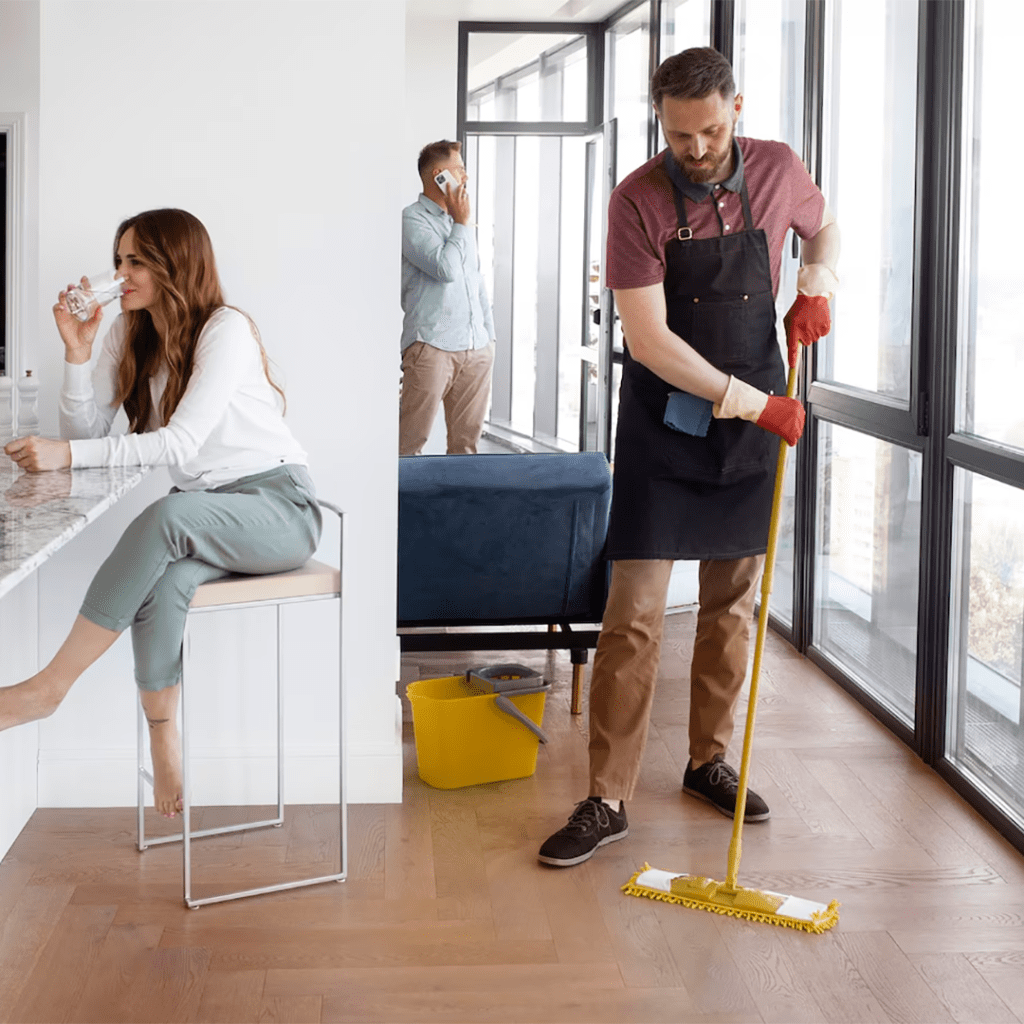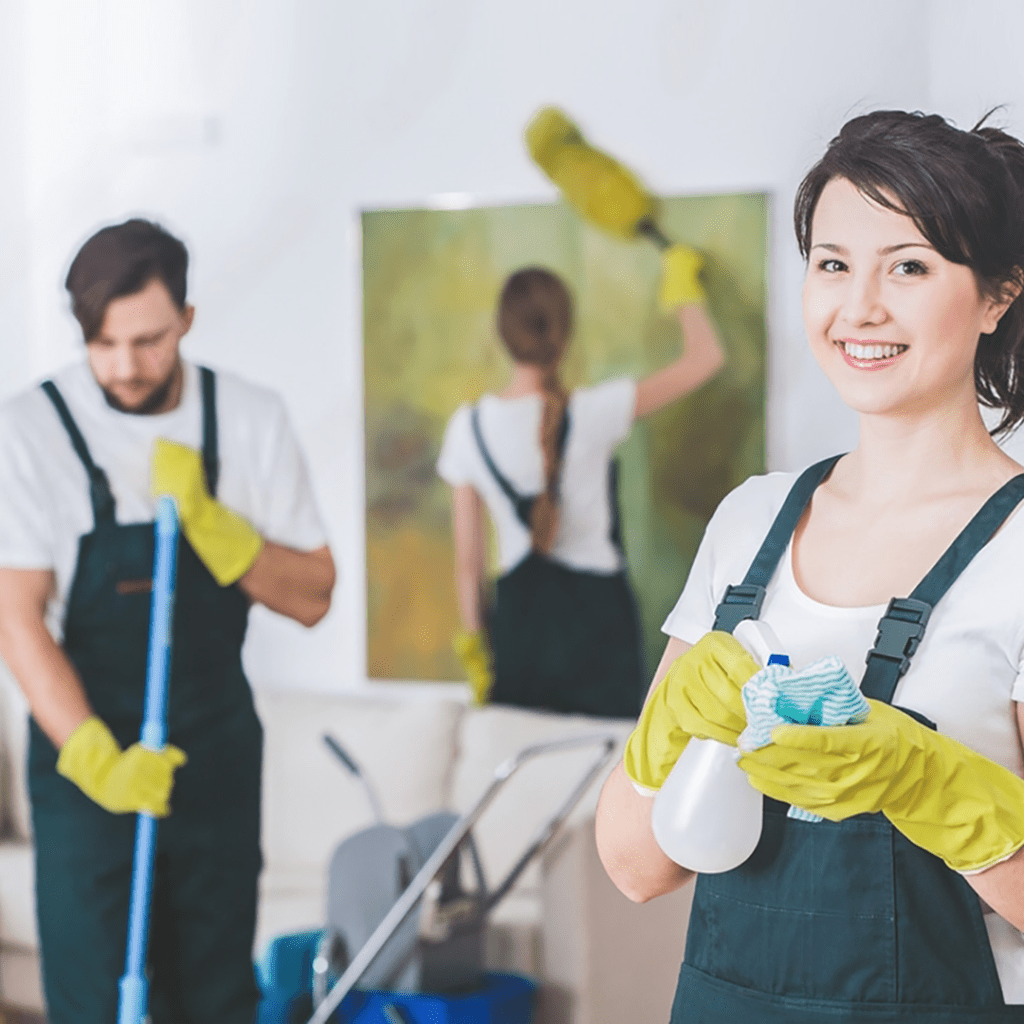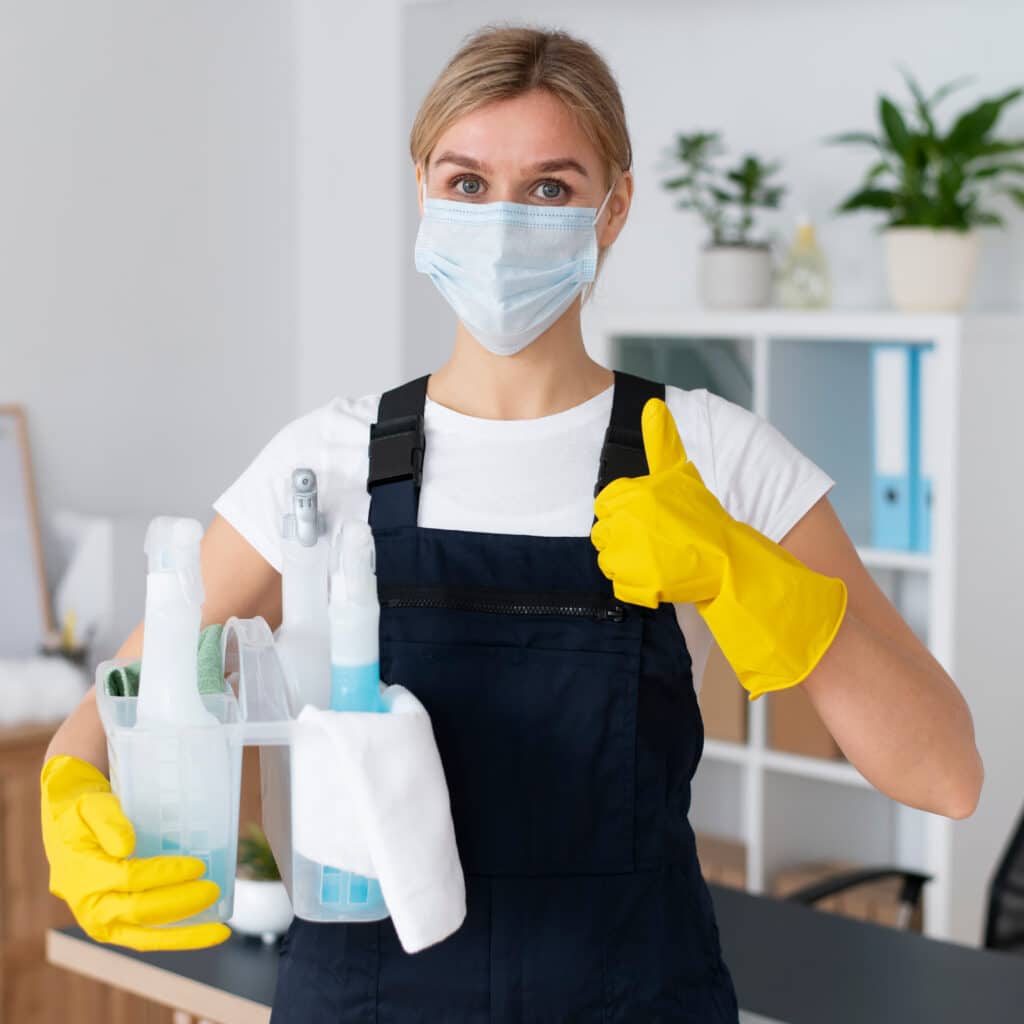The Future of Housecleaning: Predictions and Analysis

Embracing the Dawn:
Hold onto your brooms and dusters! We’re about to take a sweeping journey into the innovative future of housecleaning. Imagine a world where robots take on our chores, where homes themselves assist in their upkeep, and where ancient cleaning secrets become mainstream once more. As the dynamics of modern homes evolve, so do the techniques, technologies, and trends in cleaning. The horizon is dotted with fascinating changes, and this post is your telescope to view them up close.
From the marvel of automation to the wisdom of age-old practices, this dive into tomorrow offers a thrilling mix of the unexpected and the inevitable. Prepare to be enlightened, excited, and empowered to steer your business into the future with confidence and flair. Ready to embark? Let’s illuminate the path forward for the housecleaning industry and the passionate professionals steering its course.
Robotic Revolution:
The Automation Age in Cleaning
Robots and Artificial Intelligence have long left the confines of sci-fi movies, making their indomitable presence felt in our homes, especially in cleaning. The existing market has dabbled with devices like the Roomba, but the future portends a much grander picture. Imagine, for a moment, a world where your home robot not only vacuums but is equipped with sensors to detect different types of stains, from coffee spills to ink blots, selecting the most effective cleaning method for each.
Leading tech giants and startups alike are heavily investing in research to develop robots with more nuanced cleaning functionalities. A prototype showcased at the latest International Home Care Expo hinted at a robot that could transition between wet and dry cleaning modes, self-clean its brushes, and even communicate maintenance needs or cleaning feedback to homeowners. Moreover, with the convergence of AI and Internet of Things (IoT), these robots are anticipated to seamlessly integrate with other smart home systems, receiving commands and sending alerts as needed.
The implications are immense for both homeowners and the housecleaning industry. A robot that can autonomously manage a lion’s share of household cleaning tasks signifies more free time for families and a potential shift in the services housecleaning businesses offer. Instead of routine cleaning, the industry might find itself transitioning to maintenance of these machines, specialized cleaning tasks that robots can’t handle, or even partnering with tech companies for combined service offerings. The robotic revolution in housecleaning is not just about futuristic glitz; it’s about reshaping the way we perceive and undertake cleaning in our daily lives.
Smart Homes & Cleaning:
Integrated Cleaning Solutions
The realm of smart homes is no longer limited to voice-activated lights or remotely controlled thermostats. We’re venturing into an era where our homes don’t just respond to our commands, but proactively tend to our needs, cleaning included. As more homeowners invest in smart home ecosystems, the integration of cleaning solutions within these systems becomes increasingly paramount.
A notable highlight from the annual Smart Home Convention was the unveiling of a new integrated home system, which combined HVAC (Heating, Ventilation, and Air Conditioning) with air purifiers and autonomous cleaning bots. This system tracks the household’s activities and routines, determining the most optimal times to clean, purify the air, or adjust the home’s temperature. For example, if the system detects that a dinner party took place the previous night, it might schedule a more thorough cleaning session the next morning.
Moreover, advancements in sensor technology play a pivotal role. Sensors embedded in floors or countertops could detect spills or crumbs and send alerts to autonomous cleaners. Imagine a scenario where your kitchen countertop notifies your cleaning system of a wine spill, prompting an immediate cleanup, thus preventing potential stains.
Market leaders like Google and Amazon, who already have a stronghold in the smart home sector, are rumored to be in collaboration with cleaning device manufacturers. Their vision is an ecosystem where devices such as the Amazon Echo or Google Nest not only control music or lights but manage an entire suite of cleaning tools based on user habits, preferences, and immediate needs.
For the housecleaning industry, this symbiosis between smart homes and cleaning implies an evolution in service offerings. It’s not just about manually cleaning spaces anymore. Professionals might soon be required to understand these integrated systems, offering services that harmonize manual expertise with automated efficiency. The frontier of cleaning is on the brink of a technological renaissance, promising both challenges and opportunities.
The Rise of Organic Cleaning:
Back to the Roots
The sustainable movement has made its mark across various industries, and housecleaning is no exception. As homeowners become more health and environment-conscious, there’s a budding preference for organic and natural cleaning methods over chemical-laden solutions. This shift is more than just a fad; it’s an informed choice rooted in the understanding of long-term benefits, both for personal health and our planet.
Traditional cleaning agents, while effective, often contain chemicals that can be harmful when ingested, inhaled, or even upon skin contact. With rising awareness of these hazards, many are turning to natural ingredients like vinegar, lemon, and baking soda as reliable cleaning alternatives. These organic agents not only provide effective cleaning but also infuse homes with a natural aroma, doing away with the often overpowering scents of commercial cleaners.
Brands are catching on to this trend. In the recent CleanTech Expo, several up-and-coming companies showcased their range of organic cleaning products, promising efficacy comparable to, if not exceeding, their chemical counterparts. These products, packaged in sustainable materials and boasting eco-friendly manufacturing processes, were a testament to the industry’s shift towards a more responsible future.
For housecleaning professionals, this move towards organic cleaning presents a new avenue for service differentiation. By offering services that employ organic cleaning methods, businesses can cater to a growing segment of consumers who are willing to pay a premium for health-centric, environmentally-responsible services. The future seems green, with organic cleaning poised to be the new norm in the industry.
Specialized Cleaning Services:
Tailored to Every Need
As our societies evolve, the one-size-fits-all approach in many industries is gradually becoming obsolete. This is particularly evident in the housecleaning sector, where individualized needs and preferences are prompting businesses to offer more specialized services than ever before. These specialized services go beyond just cleaning homes; they delve deep into personalizing experiences based on unique client needs and property types.
The real estate boom, with its plethora of diverse properties ranging from studio apartments to sprawling mansions, has made it clear that each property has unique cleaning challenges. For instance, cleaning a high-rise condominium laden with expansive glass surfaces and minimalistic designs would require a different approach than a vintage home adorned with intricate woodwork and antique fixtures. Recognizing these nuances, forward-thinking housecleaning businesses are equipping themselves with the expertise and tools required for various property types.
The diverse lifestyles and health conditions of occupants have given rise to services like allergen-reducing cleaning, pet-focused cleaning, and even post-surgery or post-illness sanitization. Take, for example, families with members suffering from severe allergies. They often require deep cleaning that eliminates allergens, making their living spaces safe and breathable. For them, specialized services that focus on hypoallergenic cleaning techniques and products are not just a luxury but a necessity.
Another emerging trend in the realm of specialized cleaning is the “event-focused” cleaning. Be it post-renovation cleanup, pre-event sparkle sessions, or the all-important post-party disaster management, these are occasions where generic cleaning packages don’t quite cut it. Catering to such specific events ensures that homes and venues are spotless and tailored to the purpose they serve.
For housecleaning professionals, embracing specialization isn’t just about diversifying services but also about showcasing expertise. It’s a move that adds value to their offerings, ensures client loyalty, and can potentially carve a niche in an otherwise competitive market. As consumers continue to seek solutions that align closely with their personal needs, the demand for specialized cleaning services will only rise.
Virtual Reality Training:
The New Age of Skill Development
In recent years, virtual reality (VR) has moved from the realm of gaming and entertainment to become a transformative tool in various sectors, and housecleaning is no exception. With the increasing complexity of modern homes and the diversified requirements of clients, the housecleaning industry realizes the need for more comprehensive and immersive training methods. VR steps in as the perfect solution, offering a hands-on, realistic training environment without the real-world repercussions of mistakes.
One of the significant advantages of using VR in training is its ability to simulate various cleaning scenarios, which a cleaner might encounter. Whether it’s handling sophisticated cleaning equipment, practicing safe chemical usage, or navigating the tricky corners of an intricate living space, VR can replicate all these scenarios. For instance, a cleaning professional can practice cleaning a high-end kitchen with marble countertops and stainless steel appliances in the virtual world before they step into a real one. This not only ensures a better understanding of the task but also boosts the cleaner’s confidence.
Furthermore, VR can be a game-changer when it comes to time and cost efficiency for training programs. Traditional training might require setting up mock spaces, procuring materials, and possibly even causing inadvertent damage during the learning process. With VR, all these concerns are virtually eliminated. As housecleaning companies look to the future, integrating advanced technologies like VR into their training modules will not only elevate the quality of their services but also position them as pioneers in embracing next-generation solutions.
Subscription-Based Models:
Consistency Meets Convenience
The evolution of consumer behavior over the past decade has brought forth the preference for subscription-based models in various industries, from streaming services to monthly meal kits. The housecleaning industry, catching on to this trend, has begun offering subscription-based services, and the results have been nothing short of transformative.
At the core, a subscription model in housecleaning means that customers commit to regular cleaning services in return for cost savings, ensuring a steady flow of income for the businesses and guaranteed services for the consumer. An example can be seen with platforms like “Clean My Space,” which offers monthly or bi-weekly cleaning packages, ensuring homes remain consistently clean without homeowners having to book each session separately.
A report by MarketWatch showcased that subscription-based businesses grew nearly 300% in the past seven years. In the housecleaning domain, this model not only ensures a predictable revenue stream but also deepens the client-business relationship. A homeowner is more likely to trust and give feedback to a service they’re regularly engaged with, leading to service improvements and word-of-mouth referrals.
From the customer’s perspective, subscription models often come with perks. These could be discounts on additional services, priority scheduling, or even occasional deep-cleaning sessions thrown in at a reduced price. A case in point is the “HomeJoy Cleaning Service,” which, besides its routine cleaning, gives subscribers a discounted rate for specialized services like oven or refrigerator cleaning.
Interestingly, as the digital world continues to evolve, some platforms have started integrating AI-based predictive algorithms to adjust cleaning schedules based on client preferences and feedback. This means, over time, the service gets more tailored, knowing when to schedule deep cleanings after large events or even predicting when a home might need more frequent cleanings, such as during pollen-heavy spring months.
The momentum behind subscription-based models in housecleaning seems only set to grow. As businesses harness the twin powers of convenience and consistency, they stand poised to offer a level of service and customer engagement that was previously unimagined, solidifying their place in the future of the industry.
Mapping the Path Forward:
The world of housecleaning is in the midst of a dynamic shift, integrating technology, sustainability, and personalized touches to meet the changing demands and preferences of homeowners. As we’ve delved into, the robotic revolution promises homes maintained by intelligent machines, while the synergy between smart homes and cleaning solutions will redefine convenience and efficiency. The industry is also paying homage to nature by embracing organic cleaning practices, creating a healthier living space and a sustainable planet.
Furthermore, specialized services are ushering in an era of hyper-personalized cleaning solutions, tailored to address specific needs, events, or even seasons. Meanwhile, the adoption of virtual reality in training introduces an immersive and effective way to impart skills to cleaning professionals, ensuring top-notch service quality. And not to forget, the rise of subscription models is a testament to the industry’s adaptive nature, offering consistent, top-quality services while ensuring steady revenues for businesses.
In weaving these innovations into the fabric of housecleaning services, the industry isn’t just responding to current demands; it’s also shaping future expectations. This proactive approach ensures that as homes evolve, the methods to keep them clean, comfortable, and vibrant will evolve in tandem, promising a future where every homeowner can experience a tailored, tech-driven, and top-quality cleaning service.





Responses